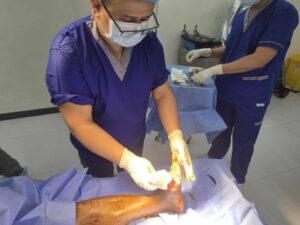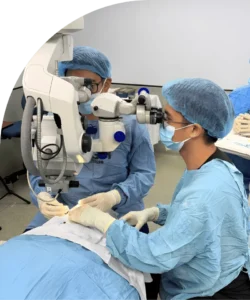Understanding the Role of an OBGYN Clinic
A professional OBGYN clinic plays a vital role in safeguarding women’s health at every stage of life. From adolescence to the postmenopausal years, these clinics provide essential care that addresses both routine wellness and specialized conditions. Women often visit these clinics for preventive screenings, reproductive care, and treatment of gynecological concerns. What makes an OBGYN clinic indispensable is its ability to offer comprehensive services under one roof, combining medical expertise with patient-centered care. By fostering a safe and supportive environment, it allows women to ask questions and address sensitive issues without fear of judgment. Choosing the right clinic ensures access to trusted specialists who can guide women through major health milestones. This holistic approach helps women maintain long-term wellness and confidence in managing their bodies.
Annual Well-Woman Exams
Annual checkups are one of the most important services offered in an OBGYN clinic. These visits typically include a pelvic exam, breast exam, and sometimes a Pap smear depending on age and medical history. Each part of the exam is designed to detect issues early, allowing timely intervention before conditions worsen. Many women also use these appointments to discuss menstrual concerns, sexual health, and lifestyle questions with their doctors. Preventive care at this level not only addresses current health but also anticipates future needs. The annual exam provides peace of mind, knowing that hidden health concerns are less likely to go unnoticed. By prioritizing regular visits, women can stay proactive about their health and reduce risks over time.
Prenatal and Postnatal Care
For women who are expecting or planning to have a baby, an OBGYN clinic is an essential partner. Prenatal care ensures the mother and baby are monitored closely, from the earliest weeks of pregnancy until delivery. This includes ultrasounds, blood tests, and checkups to track fetal growth and maternal health. After childbirth, postnatal care is just as important, focusing on recovery, breastfeeding guidance, and emotional well-being. Without proper monitoring, new mothers may struggle with complications that could otherwise be prevented. OBGYN specialists also provide counseling and education, helping families prepare for the challenges of parenthood. By offering both prenatal and postnatal services, the clinic supports women through one of the most transformative experiences of their lives.
Family Planning and Birth Control Options
Family planning is a cornerstone of women’s healthcare services in an OBGYN clinic. Women can explore a wide range of contraceptive options, from pills and injections to long-acting reversible methods like intrauterine devices (IUDs) and implants. These clinics also provide permanent solutions for women who have completed their families and no longer wish to conceive. Counseling sessions ensure each woman chooses the method that aligns with her health needs, lifestyle, and future goals. The availability of professional guidance makes it easier to avoid misinformation and select the most effective options. An OBGYN clinic also helps women switch methods when circumstances change, ensuring continuous and safe care. Ultimately, access to reliable family planning empowers women to make informed decisions about their reproductive futures.
Menstrual and Hormonal Health Management
Many women struggle with irregular cycles, heavy bleeding, or painful cramps, and an OBGYN clinic offers solutions for these challenges. Doctors can diagnose conditions like polycystic ovary syndrome (PCOS), endometriosis, and thyroid-related issues that affect menstrual health. Treatment options may include medications, hormonal therapy, or lifestyle recommendations tailored to each woman’s needs. By identifying underlying causes, the clinic helps restore balance and improve quality of life. Hormonal health extends beyond menstruation, influencing mood, energy levels, and fertility. An OBGYN clinic provides ongoing monitoring, ensuring that treatments remain effective and safe over time. Women who seek help early often find relief sooner, avoiding years of discomfort and uncertainty.
Fertility Services and Reproductive Assistance
For couples facing difficulties conceiving, fertility services available in an OBGYN clinic offer hope and guidance. Testing helps identify potential causes of infertility in both women and men, providing a foundation for effective treatment. Depending on the findings, women may receive ovulation tracking, hormone therapy, or referrals to advanced procedures like in vitro fertilization (IVF). Emotional support is also a key part of fertility services, as the journey can be stressful and overwhelming. By working with a compassionate care team, couples feel less isolated and more empowered in their path to parenthood. The clinic ensures that patients understand each step, reducing confusion and anxiety. With personalized care plans, many families achieve their dreams of having children.
Cancer Screenings and Preventive Testing
One of the most critical services in an OBGYN clinic is cancer screening. Regular Pap smears and HPV testing are essential for detecting cervical cancer at an early and treatable stage. Breast exams and referrals for mammograms add another layer of protection against breast cancer. In addition, women can receive screenings for ovarian and uterine cancers, which often show subtle symptoms that can be overlooked. Preventive testing empowers women to stay ahead of health risks and make informed decisions about treatment. The reassurance of knowing potential concerns are being monitored cannot be overstated. By incorporating regular screenings into routine visits, an OBGYN clinic helps safeguard women’s long-term health.
Menopause and Perimenopause Support
As women transition into perimenopause and menopause, they experience a range of physical and emotional changes. Hot flashes, irregular cycles, sleep disturbances, and mood swings are common challenges. An OBGYN clinic offers tailored support through treatments like hormone replacement therapy and alternative solutions. Beyond symptom relief, doctors also focus on long-term health concerns, such as bone density and heart health, which become more significant after menopause. Lifestyle counseling further helps women manage diet, exercise, and stress during this stage. Personalized care ensures women feel supported rather than isolated as they adapt to these changes. With professional guidance, women can embrace this life stage with confidence and improved well-being.
Treatment for Infections and Other Conditions
Infections such as urinary tract infections (UTIs), yeast infections, and bacterial vaginosis are common reasons women visit an OBGYN clinic. Quick diagnosis and treatment help prevent complications and discomfort. Clinics also provide screening and treatment for sexually transmitted infections (STIs), ensuring both health protection and confidentiality. Beyond infections, OBGYN doctors address vaginal dryness, pelvic pain, and other gynecological concerns. Comprehensive care helps women manage both routine and complex health issues in one trusted setting. Many clinics also emphasize education, teaching women how to recognize symptoms early and seek timely help. This proactive approach helps maintain reproductive and overall wellness.
Advanced Procedures Offered in an OBGYN Clinic
Modern OBGYN clinics are equipped with advanced technology that allows for minimally invasive procedures. Colposcopy and hysteroscopy are used to examine the cervix and uterus, providing clarity in cases of abnormal test results. Laparoscopy is another advanced procedure that allows doctors to treat conditions like endometriosis with minimal scarring and faster recovery. Having access to these procedures within an OBGYN clinic eliminates the need for multiple referrals, streamlining care for patients. The availability of cutting-edge treatments means women can access high-quality care without leaving their trusted clinic. This integration of technology and expertise results in better outcomes and improved patient satisfaction. By offering these services, OBGYN clinics demonstrate their commitment to comprehensive women’s healthcare.
Counseling and Education Services
Education is an often-overlooked but essential service provided by an OBGYN clinic. Doctors and staff offer guidance on topics such as sexual health, contraception, pregnancy preparation, and lifestyle habits that affect reproductive health. Counseling also extends to emotional well-being, recognizing that mental health and physical health are closely linked. Clinics frequently provide resources for teenagers, new mothers, and women experiencing menopause, ensuring that information is tailored to each life stage. By making education a core service, OBGYN clinics empower women to take control of their health decisions. Women who feel informed are more likely to follow treatment plans and adopt healthier habits. This ongoing support builds trust and long-lasting relationships between patients and their healthcare providers.
Frequently Asked Questions (FAQ)
1. How often should I visit an OBGYN clinic for a checkup?
Most women should visit once a year for a well-woman exam, though your doctor may recommend more frequent visits if you have ongoing concerns.
2. At what age should women start getting Pap smears?
Women should typically begin Pap smears at age 21 and continue as recommended by their doctor based on results and overall health.
3. Can I discuss mental health concerns with my OBGYN?
Yes, many OBGYN doctors address emotional well-being and can refer patients to specialists if needed.
4. What’s the difference between an obstetrician and a gynecologist?
An obstetrician specializes in pregnancy and childbirth, while a gynecologist focuses on female reproductive health. Many doctors practice both fields, making them OBGYN specialists.
5. Do OBGYN clinics offer vaccinations related to women’s health?
Yes, some clinics provide vaccines such as the HPV vaccine, which protects against strains of the virus linked to cervical cancer.










